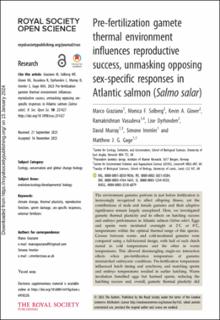| dc.contributor.author | Graziano, Marco | |
| dc.contributor.author | Solberg, Monica Favnebøe | |
| dc.contributor.author | Glover, Kevin Alan | |
| dc.contributor.author | Vasudeva, Ramakrishnan | |
| dc.contributor.author | Dyrhovden, Lise | |
| dc.contributor.author | Murray, David | |
| dc.contributor.author | Immler, Simone | |
| dc.contributor.author | Gage, Matthew J. G. | |
| dc.date.accessioned | 2024-01-16T08:44:49Z | |
| dc.date.available | 2024-01-16T08:44:49Z | |
| dc.date.created | 2024-01-12T10:30:08Z | |
| dc.date.issued | 2023 | |
| dc.identifier.citation | Royal Society Open Science. 2023, 10 (12), . | |
| dc.identifier.issn | 2054-5703 | |
| dc.identifier.uri | https://hdl.handle.net/11250/3111659 | |
| dc.description.abstract | The environment gametes perform in just before fertilization is increasingly recognized to affect offspring fitness, yet the contributions of male and female gametes and their adaptive significance remain largely unexplored. Here, we investigated gametic thermal plasticity and its effects on hatching success and embryo performance in Atlantic salmon (Salmo salar). Eggs and sperm were incubated overnight at 2°C or 8°C, temperatures within the optimal thermal range of this species. Crosses between warm- and cold-incubated gametes were compared using a full-factorial design, with half of each clutch reared in cold temperatures and the other in warm temperatures. This allowed disentangling single-sex interaction effects when pre-fertilization temperature of gametes mismatched embryonic conditions. Pre-fertilization temperature influenced hatch timing and synchrony, and matching sperm and embryo temperatures resulted in earlier hatching. Warm incubation benefited eggs but harmed sperm, reducing the hatching success and, overall, gametic thermal plasticity did not enhance offspring fitness, indicating vulnerability to thermal changes. We highlight the sensitivity of male gametes to higher temperatures, and that gamete acclimation may not effectively buffer against deleterious effects of thermal fluctuations. From an applied angle, we propose the differential storage of male and female gametes as a tool to enhance sustainability within the hatcheries. | |
| dc.language.iso | eng | |
| dc.title | Pre-fertilization gamete thermal environment influences reproductive success, unmasking opposing sex-specific responses in Atlantic salmon (Salmo salar) | |
| dc.title.alternative | Pre-fertilization gamete thermal environment influences reproductive success, unmasking opposing sex-specific responses in Atlantic salmon (Salmo salar) | |
| dc.type | Peer reviewed | |
| dc.type | Journal article | |
| dc.description.version | publishedVersion | |
| dc.source.pagenumber | 15 | |
| dc.source.volume | 10 | |
| dc.source.journal | Royal Society Open Science | |
| dc.source.issue | 12 | |
| dc.identifier.doi | 10.1098/rsos.231427 | |
| dc.identifier.cristin | 2225146 | |
| cristin.ispublished | true | |
| cristin.fulltext | original | |
| cristin.qualitycode | 1 | |
